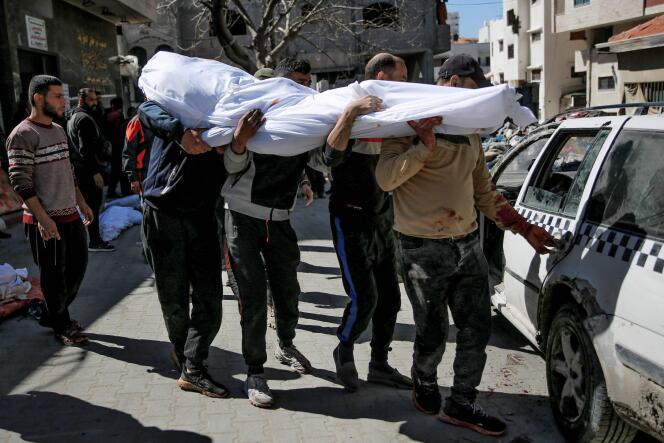
The rumor had been circulating in Gaza City for several days: Aid distributions had resumed at the city's southern gates. Some had brought back sacks of flour − for the first time in weeks. In the ruined northern suburbs of the enclave, hunger had replaced the fear of bombs.
On February 28, Saleh (whose name has been changed at his request) heard about one of these distributions on the coast. He was reluctant to go: "Every time, people come under fire" while waiting for the convoys, explained the 37-year-old father, who spoke with Le Monde by telephone – Gaza is still closed to foreign journalists. Three days earlier, at least 10 Palestinians had been killed at the Al-Nabulsi traffic circle. The United Nations has listed some 15 incidents in which Gazans were targeted during a distribution operation − almost always resulting in death.
"I hadn't seen white flour for two months. A bag [of 25 kilos] goes for around $1,000. I decided to go with some friends. We left early, before dusk, and found a spot by the sea. We lit a fire because it was cold," recalled Saleh. That evening, there were many of people, arriving in small groups as the night wore on. "Some people were on the beach, others on the tarmac road, some had taken refuge in the destroyed buildings around," described the journalist Mohammed Qreiqea, who went to the site at around 1 am and then left again.
Where did this aid come from? UNRWA, the UN agency for Palestinian refugees and currently the main provider for Gazans, was not involved. COGAT, the Israeli army's office responsible for Palestinians in the occupied territories, asserts that it came from states and international organizations. The Israelis "helped coordinate convoys with private service providers," Shimon Freedman, COGAT's spokesman for international media, told Le Monde. According to Qreiqea, the trucks belong to several large Gazan families who were already working in transport before the war.
'He died in my arms'
At around 4 am on February 29, with darkness still enveloping the enclave, the convoy arrived at the checkpoint on the Al-Rashid coastal road. According to COGAT, it was made up of 33 trucks. Wissam Shamaly, a 27-year-old Gazan, said he only counted "11 or 12." Half an hour later, the trucks were allowed to continue, accompanied by tanks. "When the aid arrived at the roadblock, people ran to grab it. The Israeli tanks then started shooting at everyone from the checkpoint," said Shamaly, who then hunkered down on the adjoining beach "for an hour, hour and a half."
You have 60.57% of this article left to read. The rest is for subscribers only.